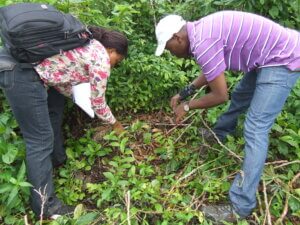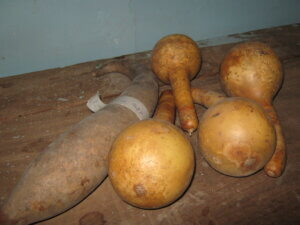Your work with religious communities has been a part of your research in Nigeria. Tell us about yourself and that work.
I’m currently a Ph.D. candidate in the ecology, evolution and conservation biology program at the University of Nevada with my research focus on the ecology and evolution of Great Basin Desert native plants. I’m originally from Nigeria, and have worked since May 2008 as a scientist for the National Centre for Genetic Resources and Biotechnology (NACGRAB), a Nigerian federal government research institution. My research in Nigeria for NACGRAB focused on the conservation and utilization of native plant biodiversity. That job gave me the opportunity to travel across the country, and work with traditional and religious institutions that hold traditional ecological knowledge of plants, including sacred plants, and their uses. I also worked with wild plant harvesters to evaluate the sustainability of their commercial harvesting, utilization and sales, in hopes of recommending ways to ensure that these plants are not being threatened by over-harvesting and overexploitation.
“[I worked] with traditional and religious institutions that hold traditional ecological knowledge of plants, including sacred plants, and their uses. I also worked with wild plant harvesters…in hopes of recommending ways to ensure that these plants are not being threatened by over-harvesting and overexploitation.”
What drew you to specifically investigate plant use by these traditional and religious institutions?
Because my main research focus is conservation of plant diversity in Nigeria, where there is relatively great dependence on natural resources for livelihood and primary health care, it is inevitable to investigate ethnomedicinal and traditional uses of plants. In recent times, many Nigerian scientists are documenting this kind of information.

A 2013 vegatation sampling/survey in Nigeria.
I decided to go beyond just documenting plant usage and look at the frequency of their harvest and how this affects the conservation of those species for posterity. Also, which of the species are considered sacred, and how strong are the traditional laws in protecting the species? Many of the threatened plants in Nigeria are confined within protected areas, but some of them are also found in sacred forests.
What factors do you think are important for doing this kind of work successfully?
Most of us who studied biology had no formal training in social science and understanding the human dimensions of conservation. Personally, my success in engaging with traditional and religious communities came with time and learning on the fly.
First, language is key; that is, being able to speak the language of the target local people and communities. Many of these people are elderly people and culturally, their societal status demands respect. Therefore, speaking to them in the local language when conducting interviews really helped. Sometimes it is customary to present them with gifts such as local wine and kola nuts. As long as I show them respect, communicate with them in the local language and present gifts, they become welcoming and share their wealth of botanical knowledge, saying “Well, you’re one of our children, so we have to help you with what you’re doing.” So over time, I noticed language is really important. And of course having respect for the people is really, really important, and in the case of my work, giving gifts is one of the ways to show respect. When working with herb sellers, one way to respect them and also earn their assistance is to buy some of their items.
Here is another example to show that language is very important. Even though Nigeria is slightly larger than Texas, there are over 300 languages there. I can only speak my own language, that is, Yoruba language, in addition to English, but cannot speak nor understand other local languages. Once, I had to go to a different State within Nigeria to do plant surveys, and also interview some of the people in the traditional communities. I also wanted to collect samples of an extremely rare sacred tree, but because I don’t speak their language, and despite bringing along a colleague who is native to the area, they were unwilling to help, saying they don’t know nor trust me.
So, another important factor for success is trust. If the traditional institutions and religious communities do not trust someone, they will not work with such a person, nor share their knowledge with them. However, trust building takes time. I have had to visit some of the people in the traditional communities regularly over time, just to chat and relax with them, without even discussing my research. Another way I have built trust is to thankfully accept and eat the food being offered to me. If I were picky with food or reject their food, that would be interpreted as not trusting them, and they won’t trust me either.
“Trust building takes time. I have had to visit some of the people in the traditional communities regularly over time, just to chat and relax with them, without even discussing my research.”
Were there results from your trust-building that you hadn’t expected, or that enriched your work?
I remember a renowned herb seller in southwestern Nigeria who helped us with plant collection beyond what we expected. I got to know her through a professor who has had a long working relationship with her. We needed some particular plant samples, but we were unable to find this tree species within its range, but when we mentioned the local name of the tree to the woman, she told us she knew the tree and offered to help us with the collection, even before we asked. We gave her some money and she went out into the dense forest and collected some samples from the tree for us, which we used for our studies and also established it in our gene bank. Without her help, we probably wouldn’t have found the rare tree, and I was blown away by that kind gesture from her.
Any tips for someone interested in doing something similar?
I’ve seen cases where other colleagues attended festivals of the local traditional communities as an effective way of gaining their trust and cooperation.
One bad experience I had was a failed attempt to interview herb sellers when they were selling their products. They weren’t happy with unscheduled visits, especially at the peak of their sales.

Lagenaria sciceraria, which is used locally in Nigeria for cultural and religious purposes.
Recently, there are concerns about access and benefit-sharing, and copyrights of knowledge acquired from traditional communities. I think researchers who intend to publish ethnomedicinal information they received from traditional and religious communities should get written permission from them, if possible, from individual respondents and interviewees.
How can you share the benefits of what you learn with the communities that shared their knowledge with you?
Having documented the sacred forests and natural sites in Nigeria, I thought to myself, “How can these places be protected?” The current Nigerian land policy does not make provision for traditional land ownership, as land ownership power is vested with the State government. This has caused frequent clashes between the State governments and the traditional communities.
I’ve been considering the possibility of creating a website to document and showcase the conservation and ecotourism values of these sacred sites, and the traditional laws that protect them. This would be a way of giving back to these communities, while also creating awareness about these sacred sites and the biodiversity they hold.





